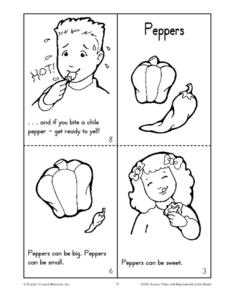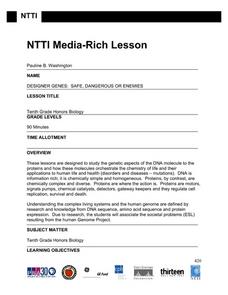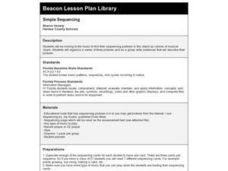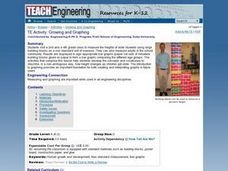Hawaiʻi State Department of Education
Ostinato
Quarter notes, eighth notes, and rests; it's time to read rhythmic patterns in music. The class plays ostinatos as they practice identifying rhythmic patterns. They then listen to Mannheim Steamroller as they draw geometric patterns that...
Curated OER
Investigation - Looking For Triangles
Seventh graders investigate a series of triangles, looking for patterns and generalizing what they have found. They analyze the pattern data and organize it into a table and graph. Students identify the relationship and discover the rule...
Science-Class.net
Rock Candy Crystals
Candy is one of my favorite words, and it's an even better word when it relates to science. Yes, candy science can happen when you grow rock candy crystals with your class. The entire process for growing these edible wonders of nature is...
Curated OER
Chile Peppers
In this Language Arts activity, students read about peppers and participate in a variety of related activities. For example, students create a chile pepper pattern.
Curated OER
Temperature and the Tomato
You will need a photovoltaic system and monitor at your school in order to obtain all of the data required to thoroughly implement this lesson plan. Your class monitors daily temperature and insolation amounts over a two week span of...
Curated OER
Plant Diversity and Distribution
Learners construct a defined plot on school grounds and observed patterns in plant life. They count trees, shrubs, cacti and record on a data sheet. They compare data and generate a plant diversity overlook for their school.
Curated OER
Planting Wheat with Little Red Hen
Students discuss the cycle of growing wheat, and then plant their own in foil pans. After the wheat grows for a couple of weeks, students participate in a story retelling activity reinforcing the concepts of the process.
Curated OER
Graphing the Population Explosion of Weeds
Learners are introduced to the seed cycle and draw the specific steps. In groups, they identify the human barriers to the spreading of weeds. After calculating the rate of spreading of the Yellowstar Thistle, they create graphs to see a...
Curated OER
What's For Dinner?
Eighth graders discover how the location of restaurants affects the future location of different restaurants. Using a fictionous town, they map the locations of all current restaurants and analyze the data to determine what type of...
Curated OER
Short Vowel Sounds
Some vowels make the same sound, like the vowels in grow and both. Read the words on the left hand side of the page (there are six) and match them to a similarly sounding word on the right hand side.
Curated OER
Simple Sequencing
Fourth graders play a stand up version of musical chairs to find their sequencing partners. In this music and language arts lesson plan, 4th graders enjoy a game that requires them to organize a series of three pictures, then write...
Curated OER
Finding Area of Similar Figures
Students explore the concept of finding area of similar figures. In this finding area of similar figures lesson, students use pattern blocks to construct similar figures. Students trace their construction and find the area. Students...
Curated OER
What Do I Want To Be When I Grow Up?
Students explore numerous types of careers. As a class, they list people they know and the types of jobs and services that are provided. Students discuss the responsibilities of having a job. Volunteer students explain what they wish...
Curated OER
Growing Rock Candy
Students observe the growth of rock candy. In this crystal growth lesson, students make rock candy and measure the crystal growth over five days.
Curated OER
Growing and Graphing
Learners visit a 2nd and a 4th grade class to measure the heights of older students using large building blocks as a non-standard unit of measure. They can also measure adults in the school community. Results are displayed in...
Curated OER
Growing Circles
Pupils identify the equation to represent a circle. In this algebra lesson, students review properties of conics and how they are related. they use a robot to create a visual of circles and their application to the real world.
Mathematics Vision Project
Quadratic Functions
Inquiry-based learning and investigations form the basis of a deep understanding of quadratic functions in a very thorough unit plan. Learners develop recursive and closed methods for representing real-life situations,...
Public Schools of North Carolina
Math Stars: A Problem-Solving Newsletter Grade 2
Develop the problem solving skills of your young learners with this collection of math newsletters. Covering a variety of topics ranging from simple arithmetic and number sense to symmetry and graphing, these...
101 Questions
Domino Skyscraper
Can a domino knock over a skyscraper? An inquiry-based lesson asks learners to calculate the size of domino needed to topple the Empire State Building. Using specific criteria and a geometric model, they find a solution.
Missouri Department of Elementary
What Color is Your Apple?
Build your classroom community with an activity that uses apples to examine oneself and their classmates. Participants draw four large apples on blank paper then exchange them within a small group. Group members write a character trait...
Curated OER
Molly Pitcher -- "Out of Many, One"
Students research, brainstorm and analyze the events that lead up to the Revolutionary War. They critique a piece of artwork depicting a scene from the Revolutionary War. Each major battle is plotted on a map to show a visual...
K12 Reader
The Snow Blows
Brrr! It's cold outside when it snows. Have your class read this poem about the snow to practice the long /o/ sound, -ow words, and reading comprehension. After reading, they respond to three questions.
Mathematics Vision Project
Quadratic Equations
Through a variety of physical and theoretical situations, learners are led through the development of some of the deepest concepts in high school mathematics. Complex numbers, the fundamental theorem of algebra and rational exponents...
Curated OER
Predicting the Greening of Spring With Red Emperor Tulips
Students examine seasonal changes by watching tulip plant growth across the continent utilizing the Journey North website. They develop hypotheses as to why the plants emerge and grow where they do.
Other popular searches
- Growing Patterns in Math
- Identifying Growing Patterns
- Growing Patterns Math
- Simple Growing Patterns
- Growing Patterns Activity
- Growing Patterns Worksheets
- Growing Patterns 100 Chart
- Growing Patterns That Double
- Growing Patterns en Espanol
- Growing Patterns in Nature
- Graphing Growing Patterns
- Growing Patterns and Rules























